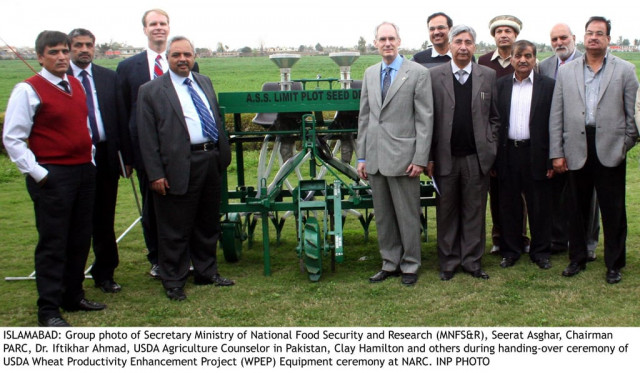Agri-tech: US transfers wheat-sowing technology
Machinery to be replicated by local manufacturers.

USDA handed over wheat-sowing
planters to various research institutions and universities that
would replace the traditional
hand-sowing system and antiquated machinery, currently
utilised in Pakistan. PHOTO: INP
The USDA, under the US-Pakistan Wheat Productivity Enhancement Project (WPEP), handed over wheat-sowing planters to various research institutions and universities that would replace the traditional hand-sowing system and antiquated machinery, currently utilised in Pakistan.
The planters will initially be utilised on pilot projects in these institutions and would be replicated to transfer the technology to farmers to enhance their crop productivity. The wheat planters were handed over to these institutions at a ceremony at National Agriculture Research Center (NARC) which was jointly organised by the USDA, International Center for Maize and Wheat Improvement (CIMMYT), Pakistan Agricultural Research Council (PARC), and several Pakistani agriculture institutions and universities.
The USDA-sponsored WPEP has imported research-grade wheat planters for provincial and university partners to increase Pakistan’s wheat productivity. Speaking on the handing-over ceremony, Secretary Ministry for Food Security and Research (MFSR), Seerat Asghar said that although the country’s population was growing fast, we have been successful in catering to increasing food needs due to research conducted in the agriculture field.
He said that the wheat sowing technology should have been transferred three decades ago, however, he remarked that it was never too late. He added that the planters would particularly help small farmers in enhancing crop productivity. The planters will be handed over to the local manufacturers to replicate the technology to ensure that farmers are able to benefit, said Asghar.
Published in The Express Tribune, March 18th, 2014.
Like Business on Facebook, follow @TribuneBiz on Twitter to stay informed and join in the conversation.



















COMMENTS
Comments are moderated and generally will be posted if they are on-topic and not abusive.
For more information, please see our Comments FAQ